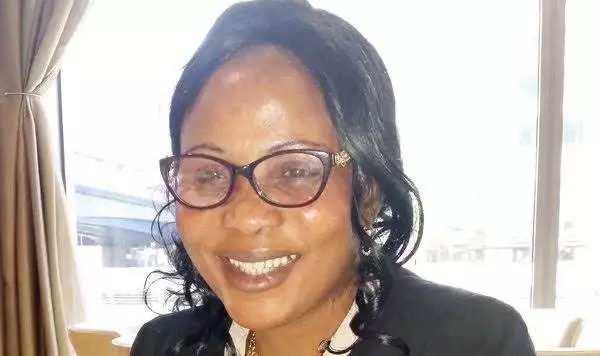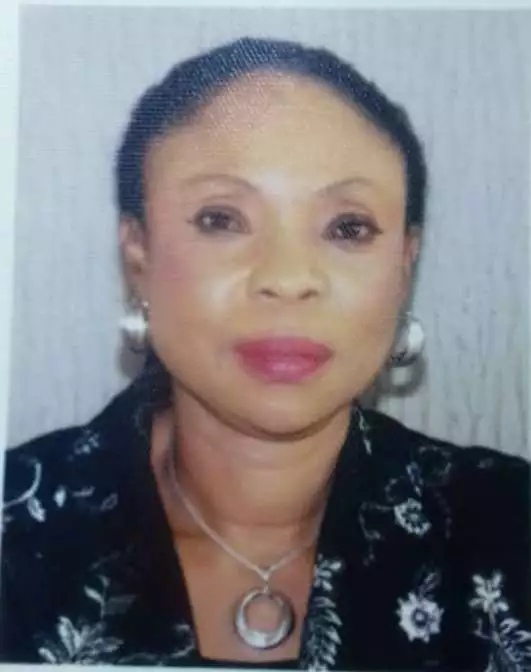While we were battling with our many problems – insecurity, hunger, anger, false, deceitful promises, broken dreams, no roads, unemployment, hopes raised and dashed, confusion, helplessness and, yes, for millions of us, sleeplessness, a consequence of all the above – a breather came the way of an important segment of our society – young, yet to be married, Police Women.
They have been unchained. The rope with which they were tied to the loins of their bosses, mostly men, has been cut. They can now walk with a swagger. And can decide their own future without any fears. They can now decide whom to get married to, and when to get pregnant for their first babies.
No more fears. And, these, thanks to Barr. (Mrs) Funmi Femi-Falana, and the Organisation where she is the Executive Director, Women Empowerment and Legal Aid Imitative, WELA. They initiated the Court judgement which freed police women from bondage. A bondage which reduced many of them to sub-human beings.
Many of us missed the landmark judgement. And that’s because it didn’t make front page news. It should have. Even Police Women did not celebrate it. They should have. Perhaps they did not even notice. They may not even have known about the case as it unfolded in a Federal High Court, Lagos.
A case that freed them from the clutches of an absolutely demeaning law. A law which made a number of them to either remain unmarried, lose the person they earlier really wanted to marry, lose pregnancies, or the time they would have wanted to have their first babies.
In some instances, to have their way, they have had to compromise their beliefs, their standards.
They are too afraid to tell their stories publicly. Even now. They die in silence, cry in the rain, and tell their stories only behind closed doors.
It is those humiliations and more that have been dealth a deadly blow by Mrs Falana and WELA. Now, they are wiped away.
The problem has been a Police Act which absolutely infringes on the rights of police women. It prohibits a Police woman from getting married to a man of her choice. Before she does that, the Act says, she must obtain permission, in writing, from the Police Commissioner under whom she is serving. Without that permission, she is stuck.
Says the relevant Act: “A woman police officer who is desirous of marrying must first apply in writing to the Commissioner of Police for the State Command in which she is serving, requesting permission to marry, and giving name and address, and occupation of the person she intends to marry.

“Permission will be granted for the marriage if the intended husband is of good character, and the woman police officer has served in the Force for a period of not less than three years.”
In simple language, it just means that a policewoman cannot get married, and cannot get pregnant until she has served the police for three years. And even after the three years, she must furnish the police with the details of her intended – name, address, what he does for a living – for investigation before permission is given. If it is not given, it is goodbye to that relationship.
A number of Police women have been unlucky. They have been refused approval by their bosses. Too bad if such bosses don’t like their faces, or the faces of their intended, or well, as in human nature, have been “eyeing that one”.
They can only murmur, and wet their pillows at night. They cannot complain openly for fear of antagonizing such bosses, for fear of being victimized.
This policy is discrimination of the worst order against women. To rub it in, it is not extended to their male counterparts. The men seek no permission before getting married. They can enlist into the Police Force today, and marry tomorrow. It is nobody’s business. They can enlist while married. It is nobody’s business. They can have children even before enlistment. It is nobody’s business. They can marry a thief or a red street woman. It is nobody’s business.
For the women, those are a no-no. If they are married, they cannot be recruited. If one is a single mother, it is a taboo.
During recruitment, female applicants are subjected to pregnancy tests – which, by the way, is good, and which I support 100 per cent because of the rigorous nature of the training that would follow on recruitment. But there is the other punishing aspect of it. When they enter Training Colleges after recruitment, they are subjected to another round of test.
I cannot confirm this, but a couple of the girls had insisted they were sent out of the Colleges on false allegations of being pregnant, and reveal, ”It is because we refused advances”. I can, however, confirm that the Police Service Commission, under the Parry Osayande, and later, Mike Okiro leaderships, intervened in a number of such cases, and had the girls sent back to College for their training.
In one particular case, former IGP Ibrahim Idris intervened. This 20-year old was sent out of the Training School because, “on examination”, she was told she had procured an abortion before she enlisted. She swore in tears: “Even though I am not a virgin, I have never been pregnant, not to talk of aborting it”.
An outraged Idris barked: “Even if she was pregnant, she is not pregnant now. You want her to lose both ways – lose a pregnancy because of her desire to be a police woman, and then lose being a police woman as well? That’s unjust.”
These are some of the indignities some women suffer just to become police women.
Yet, Nigerian girls aspiring for a career in the uniformed disciplines should thank God for little mercies. It is better here than in Egypt. There, the women, until a court threw the obnoxious law out of the window this other day, were usually subjected to a virginity test before being allowed to enlist.
Now, it is this humiliation and bondage which Police Women are subjected to in Nigeria that they have been freed from.
The battle was fought on their behalf by WELA. The organization, led by its Executive Director, Funmi Femi-Falana, filed the case at the Federal High Court, Lagos. The bone of contention: The constitutional legality of Regulation 124 made pursuant to the Police Act (Cap P19) Laws of the Federation of Nigeria.
The relevant area states thus: “A Woman Police Officer, who is desirous of marrying, must first apply in writing to the Commissioner of Police for the State Command in which she is serving, requesting for permission to marry, and giving name, address, and occupation of the person she intends to marry.”

Meaning: Their fate is tied to the whims and caprices of their Police Commissioners who are mostly men. If the Commissioner wakes up on the wrong side, too bad.
States the Act further, “Permission will be granted for the marriage if the intended husband is of good character, and the woman police officer has served in the Force for a period of not less than three years”.
In Court, Mrs Falana dismissed, as illegal, the banning of women officers, for three years, before they get married. Asking them to seek for permission before doing so is even worse. She described both as an infraction of a woman’s fundamental right to dignity and freedom of choice. And, why not?
Their male counterparts are not subjected to the same laws and inhibitions. And, Mrs Falana submitted that Regulation 124 is inconsistent with Section 42 of the Constitution and Article 2 of the African Charter on Human and People’s Rights which prohibits discrimination on the basis of sex.
She, therefore, asked the Court to expunge Regulation 124 from the Police Act. It is not justifiable in a democratic Nigerian state which has domesticated the African Charter on Human and People’s Rights and ratified the Protocol to the African Charter on Human and Peoples Rights on the Rights of Women in Africa And the Convention on the Elimination of All Forms of Discrimination Against Women, CEDAW, she submitted.
She floored the FG, which through the office of the Attorney General, represented by B.R. Ashiru, argued that the Act was to protect police women from marrying men of bad character. The three year ban on pregnancy, he also argued is because of the rigorous exercises they undergo.
The Judge threw Ashiru’s argument out. And agreed it was unlawful and, a direct insult on women.
Truth is: it was akin to treating police women as lower human beings. It was like they had no brain of their own to decide who to marry, or who not to marry. Meanwhile, their male counterparts also marry women of questionable character.
For the records, these are not the only discrimination women police officers go through. Unlike their counterparts in the military, they are not allowed to wear ear-rings, not even studs. Atimes, they are like decorations, assigned to frivolous assignments.
In the offices of very senior police officers, you are most likely to see the beautiful ones attached to those offices, and reduced to service girls, you know, to serve tea, biscuits and sweets to their bosses and visitors.
During recruitment, they are fibbly referred to, by policemen, as “Abuja chop”. Meaning: “‘These beautiful ones are for our Ogas”. It is no complement. It is sexist.
Meanwhile, Women Police officers are as good, and as competent, and as efficient as their male counterparts. They have eyes for details. Yet, most of the time, they are not so appreciated. They are not always in the Police Management Team.
The office of the Deputy Inspector General of Police is political. It means that every zone must have a DIG. It usually goes to the most senior Police Officer in the zone, unless found wanting. It is rare. But in 2015, a female Assistant Inspector General of Police, was skipped, for no reason at all, in favour of her male counterpart who was her junior. Meanwhile, she was very competent. You cannot be the Commandant of the Police elite College and not be tough and competent. That unjust action denied women a slot in the Police Management Team for that whole period. Presently, there is still no woman in the Team.
Even Governors discriminate against Women Police Officers too.
A still serving South-east governor once rejected a Police Commissioner posted to his state because ‘she is a woman’. His request, for a change, was denied by the Police Service Commission. But here is the irony. More than one year later, when the very efficient Woman CP, who usually led operations in the State to hunt down criminals, was nominated to go to NIPSS, the governor came begging to stop her from leaving. ”The best, the state has had,” he declared. She later became the DIG of the Force’s most sensitive department. Sadly, she was retired, prematurely, along with others because of a change of guards at the Force Headquarters. So much wasted brain and capable human resources.
And we should ask why no female police officer has, for instance, been appointed the Force Secretary before? They are there. And they have the capacity.
In the instant case, all thanks go to Funmi Falana and her organisation. They have done serving Police Women, and those aspiring to pursue a career in the police, a great service. They should not relent. They should ensure the judgement is implemented to its letter.
Obi is the Editor-in-Chief/CEO of The Source (Magazine), https://thesourceng.com. Email: comfortobisource@gmail.com, comfort@thesourceng.com
Discover more from The Source
Subscribe to get the latest posts sent to your email.








